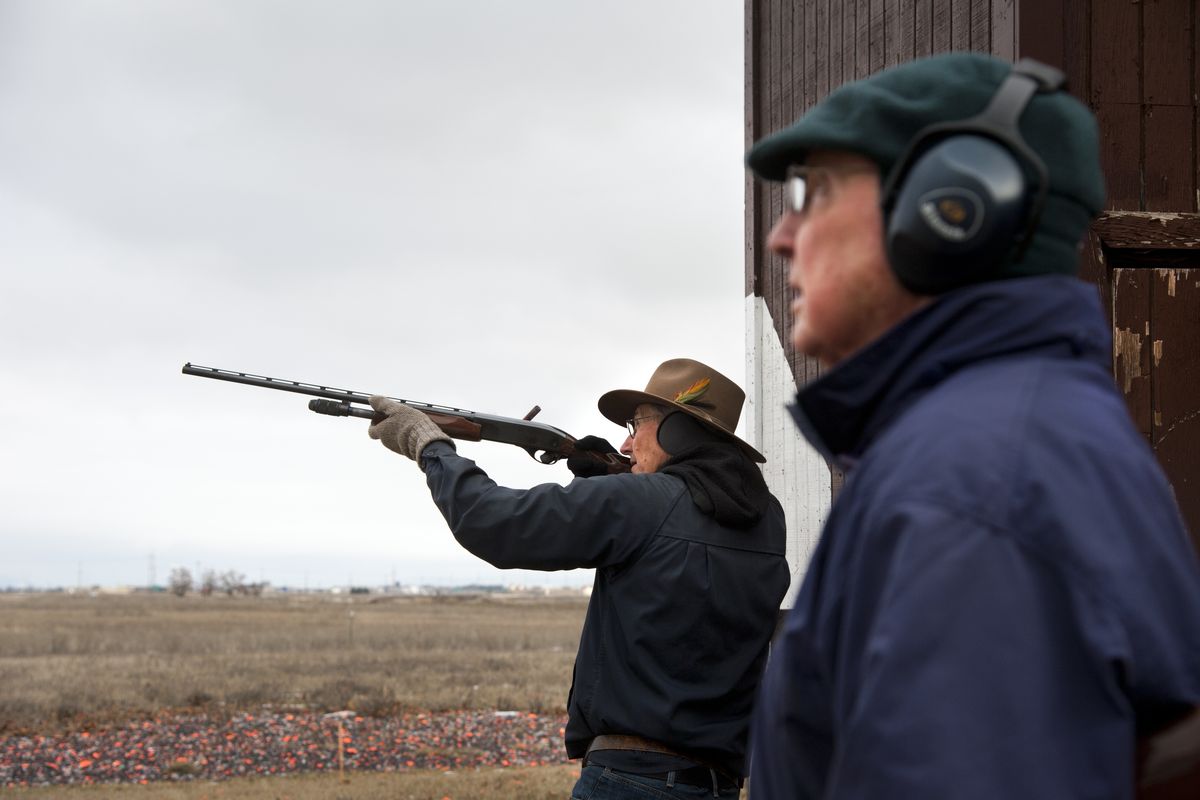County’s appraisal will cost Gun Club
Group losing tax benefit on some of its land

A brazenly calm flock of squawking Canada geese interrupted John Warning and Bill Brooks’ skeet shooting session Wednesday at the Spokane Gun Club in Greenacres.
“They don’t understand this business,” Brooks, 86, said as his shooting partner Warning reloaded his shotgun and grinned at the flock.
A tax issue with the Spokane County Assessor’s Office threatens to halt Warning and Brooks’ weekly shooting session more permanently, club officials say. There are even concerns that penalties and back taxes, based on the most recent appraisal of the club’s 100 acres at 19615 E. Sprague Ave., could bankrupt the nonprofit, which has existed in some form since 1892 and has been hosting tournaments at the site since the 1940s.
The Spokesman-Review sponsors annual trap shoots at the club.
“At the end of every year, we have 10 dollars in the bank,” said Dave Baker, a Gun Club board member who’s working with county planning officials to ease the group’s tax burden next year. “We’d have $40,000 in back taxes.”
The issue sprouted from a real estate assessment undertaken by a county appraiser last year. The club has had a longstanding agreement with the county over 40 acres of its property, primarily where lead shot lands in growing weeds north of its clubhouse, Baker said. The county has allowed that area to be classified as farm or agricultural land for years, which qualifies the club for property tax relief.
But this year, in its round of assessments that occur once every seven years, county appraisers said that land no longer met the legal threshold for a tax break because no crops were being grown on the land. Baker said the club used to lease the land to a farmer who grew grazing grass for animals on the contested acreage, but that lease ended some years ago.
As a result, the club was ordered this year to resume paying property taxes on the disputed acreage and pay back taxes for the past few years.
Spokane County Assessor Vicki Horton said she sympathizes with the club, but her office has a duty to assess their property accurately.
“I feel bad that could be a possibility, but I have to follow the law,” Horton said of the potential that the club could close because of the tax burden.
Spokane Gun Club President Les Camp said the tax penalty is unfair and could force the club to increase its membership rates, pricing several enthusiasts out of the sport.
“We want to pay our fair share, we want to do what’s right,” Camp said. “There’s absolutely no problem with that.”
“We rely on them to do things correctly,” Camp added, referring to the assessor’s office. “Now we’re having to go back seven years and pay this difference, and it’s putting us in a jam.”
The club qualified for a tax deferral program enacted under the Open Space Taxation Act by the Washington Legislature in 1970. The law freezes the property valuation of qualifying land under certain categories, including timber land, farmland and a general category for spaces that are culturally or historically significant.
Baker has been working with county Planning Commissioner Pete Rayner to resolve the Gun Club’s tax issue. Baker and Rayner are also the developers of the Beacon Hill housing and business project underway in northeast Spokane.
“It seems like we’re trying to put a square peg in a round hole,” Rayner said of the assessor’s decision to remove the Gun Club acreage from the tax relief program.
Gun club members Brooks and Warning wondered if the appraiser’s decision might be politically motivated.
“They might tax it clear out of existence,” Warning said, adding that other area shooting clubs have been pushed out of nearby communities in recent years.
But Horton said the club was not targeted. In fact, appraisers removed 118 properties from the tax relief program over the past two years, with 77 of those coming from the agricultural category, according to data provided by the assessor’s office.
The Gun Club is appealing the appraiser’s decision to the Board of Equalization, which handles disputes over the assessed value of county properties. John Pederson, the county’s building and planning director, also said the club could apply under another provision of the 1970 law to extend its tax relief, a decision the assessor’s office would not be involved in. In order to qualify under that provision, the club would have to prove to the planning department it enhances recreational opportunities in the county or that it’s a historic site.
The geese returned overhead several times as Brooks and Warning worked their way across the field, scattering shot and clay pigeons against a gray sky and snow-capped mountains to the north. Their shooting game over, the two men hiked to the nearby clubhouse for some hot coffee and tea to warm their cold trigger fingers, as club president Camp looked on.
“We’re in an outdoorsman’s paradise up here,” Camp said. “But I sympathize with our politicians. They have bills to pay, too.”